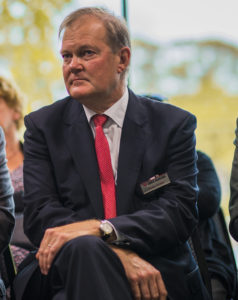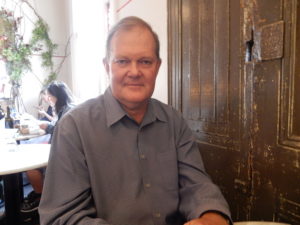From bandrooms to boardrooms
Stuart Crosby is not your average business leader.
A captain of the financial services industry who professes progressive politics; a former pub band musician who dresses in smart business suits; and, a deep and lateral thinker who is also a pragmatist.

Stuart Crosby
The newly appointed Chair of leading refugee and settlement agency AMES Australia has followed a path less travelled and appears to have seized every opportunity that has come his way.
Having worked in many parts of the globe, he has an acute sense of cultural diversity but also of the common humanity that binds us all together.
He prides himself on being able to see the multiple sides of an issue and his strong commercial acumen is tempered by an equally robust sense of social obligation.
Stuart has had an unusual career journey and it has been navigated with the help of the old adage: ‘don’t stuff it up’.
“I went to Uni and probably had more fun than was good for me. I lived around Carlton and Fitzroy playing in bands and doing casual jobs for about 10 years and never quite got around to finishing my degree,” he told iMPACT this week.
“Eventually I realised I needed to so something half serious with my life so I joined the Victorian public service,” he said.
“I ended up working for the then securities market regulator the National Companies and Securities Commission (NCSC) and I went through the crash of 1987.
“The crash produced an opportunity for me because Hong Kong closed its stock exchange and reviewed its regulation.
They decided to import some regulators and I was among some people recruited,” Stuart said.
He and his wife Liz went to Hong Kong on a two-and-a-half year contract and ended up staying five; he took two kids to the then colony and brought back three.
Stuart returned to Australia in 1994 and joined the Australian Securities Exchange (ASX) where he ran the listings operation for five years.
“That was about relationships with companies that either wanted to list or were listed on the stock exchange,” he said
In 1999, he joined Computershare, a global financial services company, and worked in business development.
“That was basically big clients and acquisitions and I spent two years in the UK,” he said.
Based in London, Stuart travelled widely and was exposed to different business cultures.
“I was given a lot of autonomy and the opportunity to learn from making mistakes – which I think is important,” Stuart said.
He returned to Australia in 2002 and rose through the company’s ranks to become CEO in 2006 just before the Global Financial Crisis (GFC) of 2007/8 hit, wiping almost $13 trillion dollars of the value of securities world-wide and almost destroying the global banking system.
“It was a terrifying and challenging time but we had a good team and we got through it. At the time the house was on fire and you were trying to find the hose rather than getting introspective about it.
“But in hindsight, I learned some things about crisis management from it. I learned to value people who can take stress out of situation like that – rather than people who add to the levels of tension.
“I have come to think that the GFC happened because there were expectations of growth in business and the economy fuelled by artificial debt creation.
“You would think that the mechanisms that allowed this to happen would have been wound back – but I’m not sure that has happened,” Stuart said.

Stuart Crosby
He sees the GFC as emblematic of the disaffection of working people in the developed world with globalisation and its effects.
Stuart says that developments in productivity gained through automation and the like – and the wealth it has brought – has been captured by “a very small group of people”.
“People on the shop floor have not benefitted from all of this I suspect,” he said.
Alluding to Brexit and the election of Donald Trump, Stuart said that throughout history every development in technology or in the way humans communicate has brought change and disruption.
“We are all battling to understand the rise of the ‘alt right’ and nationalism and isolationism. The people who voted for Trump are the people who have lost their jobs or whose living standards have gone backwards or stalled.
“I also worry about the decaying quality of information available. This so-called ‘fake news’ is really troubling.
“For example, we have just read that the reports about orchestrated sexual attacks supposedly carried out by Muslims in Germany on New Year’s Eve have no evidence to support them.
“My experiences in business I think help me to understand this but I’m not sure they much help in coming up with any solutions to address this polarisation,” he said.
But for Stuart, globalisation and its effects and are not all bad.
“Where labour has moved to places of low cost there has often been a significant improvement in the lives of people in those places,” he said.
Working with the Computershare Foundation, Stuart has been involved in development projects in several countries, including the Chad, Ethiopia, Kenya, Cambodia, Laos and Timor-Leste.
He says he has always leant toward progressive politics but not where dogma hampers development and real economic and social outcomes for people.
“I’ve always been progressive but that gets more complicated as you move through the world.
“There are significant benefits to market disciples and free enterprise,” he said.
From an early age, Stuart had sense of the stories and of the contributions migrants and refugees have made to Australia.
“Growing up in Geelong, I had lots of opportunity to see how different cultures make such a difference to Australia,” he said.
“And like most people who lived through the 60s I knew people who had come to Australia, or whose parents had come, as post war migrants. In our community there were Dutch and Italians and people from other places in southern Europe.
“In those days I met people whose parents had been through refugee camps and our global obligations on refugees are just as obvious now as they were then.
“But the level of political debate on these issues from the time of the Tampa onwards has really disappointed me,” Stuart said.
Stuart says the Computershare Foundation was established as the company spread globally and its mission was to support projects in the developing world.
He says that many companies put intellectual frameworks around their social programs and ‘good deeds’.
“I never saw the need to rationalise that, it just seemed the right thing to do,” he said.
He says that under British-based corporate law, companies are all about the interests of the shareholders but in other jurisdictions employees and others also have legal status as stakeholders.
“Now we live in at a time when there is a lot of criticism and scrutiny of business and so businesses have had to humanise themselves. They’ve had to work to look less dark than they sometimes appear,” he said.
After seven years at the helm of the Computershare Stuart went into semi-retirement in 2014. The company now has a market capital of $7.4 billion.
“Since then, I have been consulting and also working on the board of an innovative Australian business that makes plumbing fittings and is expanding globally,” Stuart said.
“Now becoming the Chair at AMES Australia presents and new and interesting challenge for me.
“I’ve always felt socially obliged and I’ve always had sense of the importance of Australia being inclusive as a society.
“AMES is in a very unusual and special position because it is a government-owned organisation operating in a space where most organisations aren’t. That gives us some strengths and weaknesses and some opportunities and threats.
“That means we have to think about things carefully and in different ways to other people working in similar environments.
“AMES historically has dealt with these circumstances very, very well. One of the challenges for the new Chair is to not stuff that up,” he said.
So, in the face of the rise of nationalism and isolationism and with 65 million people displaced globally, does the new AMES Australia Chair see any reason for optimism?
“In the short term it’s difficult to see many for optimism. But if you take a longer view, mostly the world is a better place than it was 100 years ago and 100 years ago it was a better place than a century before that,” he said.
“Poverty rates are falling, literacy is on the rise, humanity has never been wealthier or healthier. So while currently things may seem challenging, there are reasons for optimism,” Stuart said.
Laurie Nowell
AMES Australia Senior Journalist












